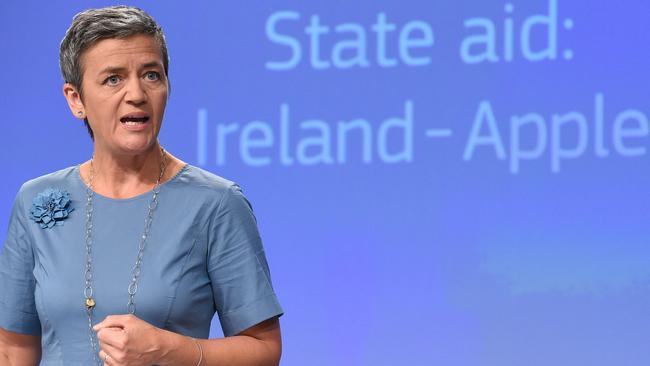The EC’s finding against Ireland’s taxation of Apple explained
The EU has found Ireland hasn’t been taxing Apple properly since 1991. Where did the money go and what’s next?

Understanding the ins and outs of the European Commission’s finding against Ireland’s taxation of Apple and its longer term consequences isn’t easy. But it does potentially light a fuse on already tense economic relations in Europe with a fight between the US and EU also on the cards. Here’s 10 points on the ruling and the consequences that might help you:
What exactly was the investigation?
The European Commission (EC) says it conducted a two-year investigation into the taxable profits of two Irish incorporated Apple companies, Apple Sales International and Apple Operations Europe. It says Ireland had been charging Apple “artificially lowered” tax since 1991. It says almost all sales profits recorded by the two Apple companies were internally attributed to a “head office”. It says these “head offices” existed only on paper and could not have generated the profits. Apple therefore only paid an effective corporate tax rate that declined from 1 per cent in 2003 to 0.005 per cent in 2014.
Is Ireland left holding the baby?
The EC’s finding is against Ireland for not taxing Apple sufficiently. Ireland is left with a $19bn black hole to fill and an order to recover the funds from Apple. It must also be shuddering at the thought of the same ruling being applied to other international companies operating out of Ireland.
Is the EU trying to take over taxation law in Europe?
The EC isn’t claiming it sets taxation law across the EU. Rather, it is claiming a breach of competition policy by Ireland. It is saying that Ireland breached policy it had signed up to as part of being a member State. In particular it had breached a state aid rule that “Member States cannot give tax benefits to selected companies” and therefore Ireland’s treatment of Apple was “illegal under EU state aid rules”.
Could Ireland do a ‘Brexit’ and vote to leave the EU?
This could be tempting. The EC’s finding could equally be applied to some other companies that enjoy favourable tax rates from being registered in Ireland and this is the sting in the tail. If Ireland is being told to give up this role and that its taxing of all these companies breaches the same rule, then it might regard being out of the EU as the lesser of two evils. It would have to consider how its economy could operate without that role and as a separated country. And its economy has been fragile.
Could Apple ‘move’ from Ireland to the UK?
For its part, the UK has already made an overture to Apple that it could relocate its investment operations there. In response to the EU ruling, Prime Minister Theresa May’s office is reported as saying it welcomes any company wishing to invest in Britain and its workforce. That outcome too would be a disaster for Ireland and there is a risk of a huge trade war in the fallout from this ruling. One question for Apple would be its access to the European market from an EU-separated UK. Is there any tax benefit from being there? Does the UK offer any benefit at all as a portal to Europe? To allay concern, Tim Cook in his letter says Apple remains committed to Ireland where it has operated a factory in Cork for 36 years.
Can the EU demand that Ireland recover all alleged shortfalls since 1991?
The EC says it can only order recovery of “illegal state aid” for a ten-year period before it first requested information on the tax arrangements in 2013. The recovery is therefore limited to 2003 - 2014 of up to €13 billion ($A19.3bn) plus interest.
Did this tax shortfall affect other countries in the EU?
The EC says Ireland’s tax treatment of Apple let it avoid taxation on almost all profits generated by sales of Apple products in the entire EU single market. This was due to Apple’s decision to record all sales in Ireland rather than in the countries where the products were sold. Customers were buying products from Apple Sales International in Ireland rather than from the shops that physically sold the products to customers.
So where did the money go?
According to the EC investigation, the two Apple companies make annual payments to Apple in the US to fund research and development. In 2011, the amount paid was about US$2bn. These expenses contributed to fund more than half of all research efforts by the Apple group in the US to develop its intellectual property worldwide.
What does Apple say to all of this?
In his open letter posted online, Tim Cook says Apple never had asked Ireland for a special deal on tax, never received any special deals, and that the EC’s response is a devastating blow to the sovereignty of EU member states over their own tax matters. He says a company’s profits should be taxed in the country where the value is created and that Apple, Ireland and the US agree on this. He says nearly all of Apple’s research and development takes place in California. Therefore the vast majority of its profits are taxed in the US.
What is the US saying about this?
The US itself has been concerned about the level of tax paid by the US corporate sector to it, with reports of up to $US1.2tn held by US companies outside its taxing ambit. However there is almost universal condemnation of the EC’s finding against Ireland and Apple, and a fear that US taxpayers inevitably will bear the brunt of recovery of this money. The White House is reported as saying that Apple could deduct payments from the amount owed to the US government.




To join the conversation, please log in. Don't have an account? Register
Join the conversation, you are commenting as Logout